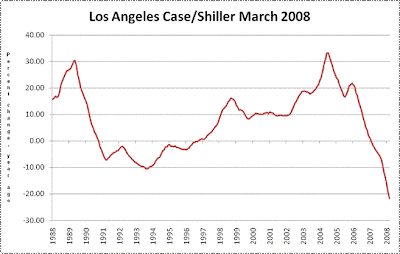But..
We are finally seeing more positive signs across a wider breadth of markets than we were before. With the Case/Shiller numbers coming out today for March 2008 we again saw record prices drops in many markets. There was a denial of what was happening for so very long, it culminated locally into the worst sales volume on record. The people whose job it is to know and make market in the resale arena were failing miserably. It is only the lenders, following a very simply formula, that are leading the charge and finding market value. The formula is simple, get a few opinions on valuation, set the price, if it doesn't sell after a reasonable period of time, cut the price until it does. They aren't wed to the intial price, their egos aren't wrapped up in the home, they haven't made grandiose plans of what they are gonna do with the windfall when they sell the home. It is just price to sell, sell it and move on. When you have a number of homes to sell into a falling market this will ensure you maximize your money as the market falls. For a resale homeowner, they have only one home to sell and are trying to maximize that one sale and generally come on the market with a "wish" price that an agent has assured them they can get for their home. You are now seeing a bifurcated market with distressed sales and foreclosures making a larger and larger percentage of closed sales.
Price drops are the first step on the road to recovery, we have moved past denial and into acceptance. At least the lenders have.
This brings us to a Bloomberg article which reinforces the article I highlighted here yesterday from the WSJ.
We are seeing very similar behavioral patterns across the nations in varying bubble markets. We saw similar patterns develop during the boom. While agents like to say that all real estate is local we clearly see that isn't true. There are national components to real estate that unite markets, interest rates and lending policies for example. The same reason we saw a national housing boom is why we are seeing a housing bust in those same markets. We get tighter underwriting restrictions for loans and mortgage insurance at the same time loan servicers realize they aren't doing themselves any favors holding onto inventory, we then have the environment we are in today.Karl Case, co-founder of a home-price index that bears his name, said more auctions of foreclosed properties will hasten the reduction of inventories from record levels and may lead to a faster housing recovery.
``I think we're going to see some signs of life in the next few months,'' Case, an economics professor at Wellesley College in Wellesley, Massachusetts, said in an interview with Bloomberg Radio. ``The market is beginning to clear somewhat. There is some good news in this.''
...
Case said the quickening pace of home-price declines reflected mounting auction sales along with traditional transactions. ``Banks don't wait around,'' he said. ``They put it on the market and get rid of it. That means prices adjust more quickly,'' and it ``clears the inventory out faster.''
Here is the National, 10 city composite and 20 city composite of the Case/Shiller chart:

Here is the Los Angeles area chart:

One of the issues that I have with any price index is that it is telling you what is happening with what has sold, not showing you what is happening with what hasn't sold. As we were seeing mid-2006 through 2007 as sales slowed the low end slowed dramatically and the higher end homes still did ok. We weren't given an indication of the stress building in that sub-market by looking at price. Now we are seeing an uptick in sales on the low end with the higher end home sales stalling. The higher end markets may feel comforted by the fact that they haven't seen big price declines in volume, but the truth is we don't know what the market value really is for those homes. It is somewhere below where they are at now. Just how much further down is the billion dollar question. I still firmly believe that sales volume is a much more accurate indicator of market conditions.
No comments:
Post a Comment